 Petzlover
Petzlover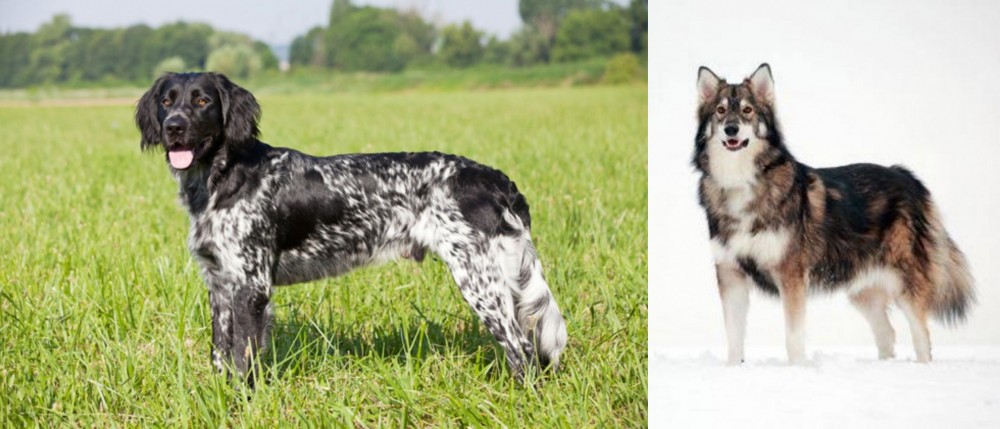 Large Munsterlander is originated from Germany but Utonagan is originated from United Kingdom. Large Munsterlander may grow 19 cm / 7 inches shorter than Utonagan. Large Munsterlander may weigh 8 kg / 17 pounds lesser than Utonagan. Both Large Munsterlander and Utonagan has almost same life span. Both Large Munsterlander and Utonagan has almost same litter size. Both Large Munsterlander and Utonagan requires Moderate Maintenance.
Large Munsterlander is originated from Germany but Utonagan is originated from United Kingdom. Large Munsterlander may grow 19 cm / 7 inches shorter than Utonagan. Large Munsterlander may weigh 8 kg / 17 pounds lesser than Utonagan. Both Large Munsterlander and Utonagan has almost same life span. Both Large Munsterlander and Utonagan has almost same litter size. Both Large Munsterlander and Utonagan requires Moderate Maintenance.
 The Large Münsterländer hails from the Münster region in Germany. It was in 1919 that the first breed club was founded.
The Large Münsterländer hails from the Münster region in Germany. It was in 1919 that the first breed club was founded.
The dog’s ancestors were different Spaniel breeds as well as the German Longhaired Pointer. The dog quickly became a sought after hunting dog in Europe.
The Large Munsterlander Association of America is the only official breed organization for this dog. The dog was recognized by the United Kennel Club in 2006.
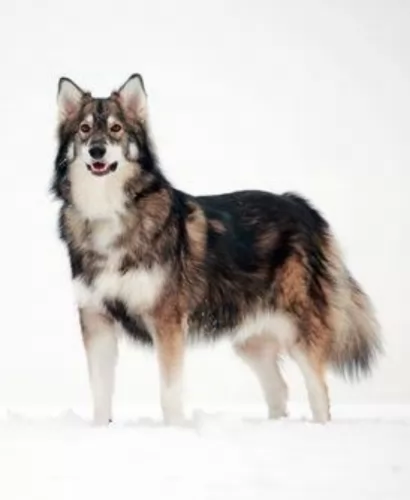 The Utonogan is such a wolf-like dog, you couldn’t be blamed for thinking you’d come face to face with a true wolf. They’re a rare dog breed that came about from crossing the Siberian Husky, the German Shepherd and the Alaskan Malamute.
The Utonogan is such a wolf-like dog, you couldn’t be blamed for thinking you’d come face to face with a true wolf. They’re a rare dog breed that came about from crossing the Siberian Husky, the German Shepherd and the Alaskan Malamute.
The dog was developed by Edwina Harrison and it was in the 1980s that the dog was introduced into the UK.
The Utonagan is a rare dog with only a few breeders. Take care with where you buy your Utonogan from and certainly steer clear of backyard breeders or puppy mills.
 The medium to large Large Munsterlander stands between 60 to 65cm at the withers and weighs about 28 to 32kg.
The medium to large Large Munsterlander stands between 60 to 65cm at the withers and weighs about 28 to 32kg.
When you look at him, you get the feeling that you’re looking at a springer spaniel. He has long broad feathery ears and also a long feathery tail. The head is fairly broad and somewhat rounded.
The coat of the dog is long and dense, and is quite wavy with feathering around the legs and tail. He can be black and white or be a reddish brown with patches or ticking because of the piebald gene. If you allow your Large Munsterlander to become a parent, the average litter of this dog is 5 to 10 puppies.
The Large Munsterlander is essentially a tracking, retrieving dog. He makes an excellent hunting dog and these instincts are strong within this particular breed. It is why some breeders only give their puppies to serious hunters.
He is an active dog, and because he loves to retrieve, ball games will suit him down to the ground. Take him with you on your walks as he is a naturally athletic, active dog.
He loves water too and won’t need a second invitation from you to jump right into dams or pools. He is such an easy going dog, getting on well with children and pets in the home and being a good first choice for first time dog owners too. However, he requires plenty of exercise.
Because he is a hunting and retrieving dog, he will be far better suited to living in a home where there is a fair sized garden. He isn’t regarded as a city dwelling dog. These are dogs that just love to be outside and running around.
The Large Munsterlander can be a boisterous dog, so teaching him some basic commands such as ‘come, stay, lie-down, sit or heel’ will improve the way he behaves inside the home and when in the company of other people.
Training and socialization will do him the world of good and it means you can take your dog anywhere – he’ll always be well behaved, becoming a calm, gentle dog.
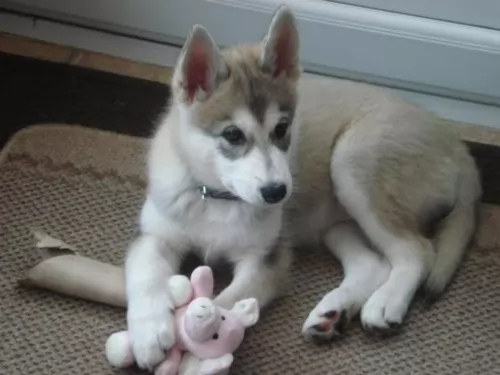 These dogs are large and lean, looking vibrant and strong. They stand at between 63-84 cm in height and weigh roughly between 32-40 kg.
These dogs are large and lean, looking vibrant and strong. They stand at between 63-84 cm in height and weigh roughly between 32-40 kg.
The body is long with strong but slender legs with webbed paws. They look like wolves with the sharp muzzle, the erect ears, bushy tails and slanted eyes with black eye rims. The double coat is thick and straight. Colors of the coat can be silver or gey, cream, brown, or black. The coat becomes thicker in the Winter.
The Utonagan is a very social dog, wanting to spend a lot of time with his human family. They have so many excellent qualities that make him a splendid pet - loving, loyal and gentle.
Whether you have other pets in the home or children, he is a dog that is able to get on with everyone. He is wary of strangers though and with training ad socialization he is going to be the most fantastic pet and companion.
 As a sporting dog, the Large Munsterlander loves his exercise. You can involve him in all kinds of outdoor activities, and he’ll readily join in, from swimming, to hiking to ball games to just plain running for the fun of it.
As a sporting dog, the Large Munsterlander loves his exercise. You can involve him in all kinds of outdoor activities, and he’ll readily join in, from swimming, to hiking to ball games to just plain running for the fun of it.
Always be careful with puppies though, before you involve such a young dog with such strenuous exercise. For a better chance of avoiding hip dysplasia, it is better to wait till he is about 12 months old before you involve him in too many lively activities.
He’s an easily trainable dog too, and the fact that he is a calm, gentle dog who is loving and loyal makes him an excellent pet choice.
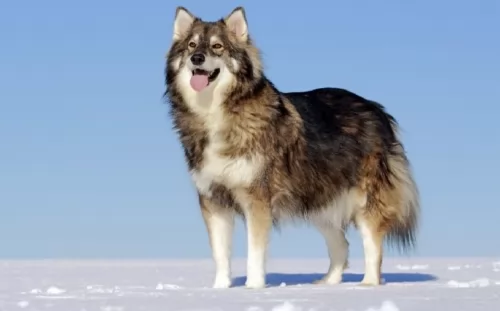 The Utonagan is an intelligent dog and also very social and people-oriented. He wants to be part of his human family, with a friendly, playful nature.
The Utonagan is an intelligent dog and also very social and people-oriented. He wants to be part of his human family, with a friendly, playful nature.
He will certainly not like being left alone and outside day after day. He can become frantic with frustration and this can be laid at the feet of an irresponsible dog owner.
Give him the life he wants and deserves, and this beautiful wolf-like dog will be your friend for life.
 All dogs can develop some health problems no matter how healthy they are, but when they are happy dogs, they’re well fed, exercised and loved, they have a better chance of reaching a ripe old age.
All dogs can develop some health problems no matter how healthy they are, but when they are happy dogs, they’re well fed, exercised and loved, they have a better chance of reaching a ripe old age.
Large Munsterlanders are generally healthy dogs. Some conditions reported in the breed which are highly unlikely to affect your dog, but are good knowing about are hip dysplasia, cataracts and osteochondrosis.
This is a common condition where the joints of quickly growing puppies are affected. The surface of the joint doesn’t convert into bone in certain areas. The result is thickened cartilage which detaches from the surrounding normal cartilage, forming a flap.
Osteochondrosis causes the development of osteoarthritis, affecting certain joints of the dog. Both genetics and the wrong diet are causes of osteochondrosis.
It isn’t always possible to feed your dog wholesome food, but always try to get the very best quality food there is. Also, don’t allow your young Large Munsterlander to be involved in strenuous exercise before he reaches one year of age. Pounding around can put abnormal weight on the joints which can spell problems when the dog is older. Osteochondrosis mostly affects large and giant breed dogs.
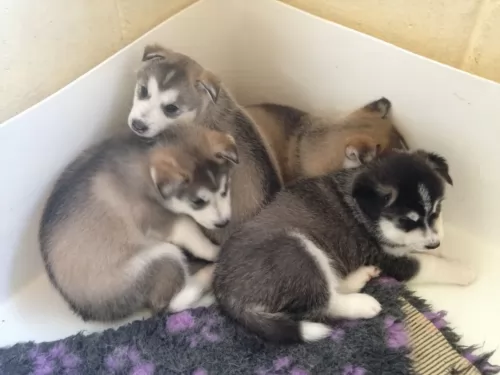 Yur Utonagans can live to be between 12 and 15 years of age, but a few issues can include cancer and joint dysplasia.
Yur Utonagans can live to be between 12 and 15 years of age, but a few issues can include cancer and joint dysplasia.
Cancer is a major cause of death in dogs old and young. There also seems to be some dog breeds that are more prone to cancer than others.
Thankfully most of the cancers are curable if you get them in the nick of time. The warning signs of cancer in your dog is much the same as with people and you’ll discover a new lump on your pet or a wound that simply won’t heal.
When you detect that your pet is lethargic and not acting his usual perky self, it is time to get him immediately to the vet.
 The Large Munsterlander puppy will require 4 meals a day. When he reaches a year of age, you can give him two smaller meals a day.
The Large Munsterlander puppy will require 4 meals a day. When he reaches a year of age, you can give him two smaller meals a day.
He is a large, active dog and if you feed him manufactured dog food, make sure its high quality and that it caters to his age and energy levels. His dry kibble can be mixed with cooked chicken, brown rice or pasta and cooked or raw vegetables occasionally.
Raw meat can be expensive, but every dog requires some raw meat in the diet every now and then. Without some raw meat, you dog may well suffer with skin problems and a dull coat.
If your dog is still an active hunting dog, a high fat, high protein diet will be good for him. When in any kind of doubt, speak to a dog expert or your vet about how to feed him for health and longevity.
As a sporting hunting dog, the Large Munsterlander has high exercise needs. He most certainly won’t do well in a tiny city garden as he is an outdoor dog wanting to be running and exercising. If you choose this particular dog breed, make sure that you take him on walks, allow him off his leash in the park, play ball games with him and take him with you when you go on hikes.
With his silky coat, you want to be brushing your pet twice a week. If he has been out hunting with you, while brushing him, check for twigs, grass and burrs tangled in the hair.
Other basic care includes trimming the nails, keeping the ears clean and dry inside, brushing the teeth with a canine-approved pet toothpaste and toothbrush for good overall health.
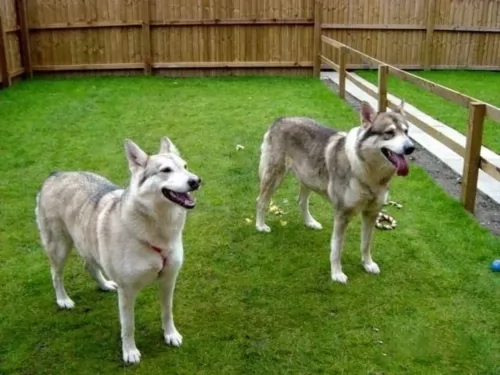 These are very high energy dogs and they will need exercise every day. While they will love a walk, they would be happier with something more vigorous such as a hike.
These are very high energy dogs and they will need exercise every day. While they will love a walk, they would be happier with something more vigorous such as a hike.
Swimming, ball games and hide and seek will all need to be on this dog’s menu of events. It is why it’s a dog that is better suited to life in the country as opposed to life in the city.
If you opt to buy this dog commercially manufactured food, he will need to have a high quality one high in vitamins and minerals and designed for energetic dogs. Try and avoid the inferior brands as they are packed with ingredients that can be of no value to your pet. There are ingredients which can actually make him sick.
Home-made food is always a good thing for dogs, especially when it is simple, nutritious food that won’t aggravate the stomach.
You can’t go wrong with foods such as boiled chicken, brown rice, and vegetables such as spinach, carrots and sweet potato. A little bit of raw meat added in occasionally can be excellent as well. Always make sure that a bowl of fresh water is available to your pet around the clock.
This is such a beautiful dog, you want to keep him that way. His thick coat is going to require regular brushing to keep it free from matting. Not only that, grooming stimulates the skin. You can also check him over at the same time for ticks and fleas and make sure there aren’t any unusual lumps on the body.
This type of dog values the grooming session as it is a bonding time for him, making him that much happier and content.
Other grooming needs will include taking care of his nails and checking inside his ears and mouth for signs of infection.